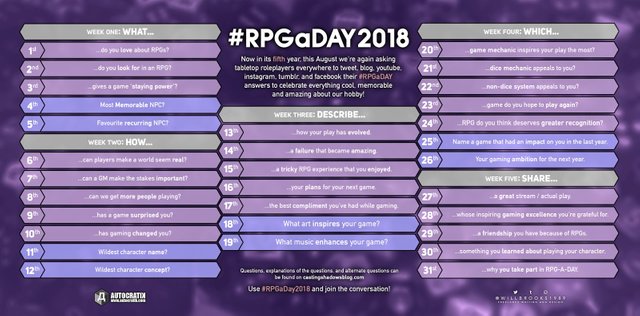RPGaDay 21: What dice mechanic appeals to you?
I love dice mechanics; since I'm a game designer this is to be expected.
People who've been following me know that I often extol the merit of dice pools, but I think that I can simplify further what I like to see in dice mechanics.

(questions and image from autocratik.blogspot.com)
I'm a big fan of "one and done" dice mechanics. The sort of things that have all the information you need from a roll built into them.
This means that you wind up with a very small number of options that fulfill this. A single d20 does not provide a whole lot of meaningful resolution, but a dice pool system or a d100 can. Hammercalled is built on the notion of taking a d100, and using the 10's place to determine magnitude and the total to determine relative success. There's some ignored outcome space there (e.g. 1's place, doubles), but it still provides enough precision that you never need to roll two dice at the same time (well, barring the fact that most people have two separate dice to tally d100 on, but that's not the same as rolling twice in terms of once-then-again systems like D&D).
The thing that I think really stands out in Hammercalled is how simple and universal the system is.
It's not, essentially, my favorite system ever as far as the raw dice mechanic goes, but it highlights what I like about having a single roll for resolution. There are concessions made for simplicity: I wanted Hammercalled to be incredibly novice-friendly from the start, and while it's grown a fair deal to the point where it's probably not that much easier than any other game, it's still got a pretty simple to remember core mechanic (roll, check if at or under, check tens place) that doesn't ever change.
One of the flaws in dice pools is that typically players roll different dice or interpret the results in a different manner based on their characters, and that's potentially very complex (e.g. rolling more dice needing a different individual TN). Something like West End Games' D6 system manages to clamp this down to a single variable (rolling dice), but at the cost of using an addition system that can definitely create predictable outcomes.
When you have a success mechanic based on the outcome of individual dice, a pool allows even powerful characters to experience risk, and less powerful characters to always have a chance of success, or at least usually have a chance of success depending on the difficulty of the taks they're attempting.
This is the real reason that I'm drawn to dice pools. They're simple and beautiful, with no lack of resolution for a potential result scale.
However, they have their downsides, so while I love them to the deepest recesses of my cold unfeeling heart, I don't always use them.
Still, I'm really appreciative of having the ability to resolve everything with a single cast of the dice. I'm sure someone somewhere has looked into how much time this actually takes and maybe my thoughts about it being more efficient are incorrect.
This is where the second part comes in.
I find it infinitely more exciting to have a single dice result have a bigger narrative impact. The two-stage system of something like D&D may be pretty slick and fluid when it all comes together, but the fact remains that unless you're rolling all the dice simultaneously and checking the result after the fact you're eliminating some of the impact of your first roll if you roll poorly on the second.
That means that over time that to-hit roll loses its significance, but the damage roll doesn't gain as much significance as the to-hit roll loses.
When you have everything in a single roll, and that roll carries a lot of weight, you have a very significant datapoint to examine when determining a character's success and failure.
You also don't wind up in a spot where you'll ever have meaningless results, like a very high to-hit die in D&D can create. "I'll probably hit, but will I do damage?" is not as fun as "Will I hit and do a lot of damage, or barely tap the enemy?"
Basically, when everything hinges on a single roll, you wind up with some downsides, like the potential to not have enough information to interpret diverse results, but you also get a lot of speed and you add more excitement to that one roll, and that's why single-roll resolution systems are my favorite dice mechanic.